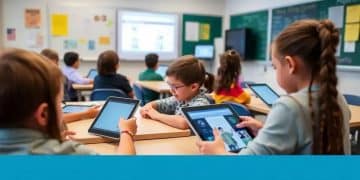Remote learning platforms trends: What to expect in 2024

Remote learning platforms are evolving with advancements in technology, emphasizing interactive tools, personalized experiences, and global access to education, ensuring effective and engaging learning for diverse student needs.
Remote learning platforms trends are rapidly evolving, changing how we approach education. Have you ever wondered how these innovations might change your learning experience? Let’s explore what’s on the horizon.
The evolution of remote learning platforms
The evolution of remote learning platforms has been remarkable, significantly changing how students and educators interact. Over the years, these platforms have transformed from basic video conferencing tools to comprehensive learning ecosystems that enhance the educational experience.
Key Developments in Remote Learning
Initially, remote learning relied heavily on simple email communication and static websites. However, advances in technology brought various features to enhance learning.
- Integrative tools for collaboration and communication.
- Enhanced multimedia support for interactive learning.
- Flexible course designs catering to different learning styles.
Today’s remote learning platforms offer interactive elements such as quizzes, forums, and live feedback, creating a more engaging environment. These features not only make the learning process enjoyable but also cater to diverse student needs.
With the integration of artificial intelligence, platforms can now provide personalized learning experiences. This technology analyzes individual student performance and tailors content accordingly. As a result, learners can progress at their own pace, which significantly improves knowledge retention and satisfaction.
Future Trends in Remote Learning
As technology continues to evolve, we can expect the next generation of remote learning platforms to incorporate even more advanced features. Virtual reality (VR) and augmented reality (AR) may play a crucial role, allowing students to engage with content in immersive environments. Imagine studying biology by exploring a 3D model of the human body!
The rise of mobile learning applications has made education accessible anywhere and anytime. This flexibility is crucial for today’s learners, who often juggle multiple responsibilities. As remote learning becomes more widespread, we will likely see a greater emphasis on social learning experiences, encouraging collaboration among peers across geographical boundaries.
Key trends shaping online education

Several key trends shaping online education are influencing how learners interact with content. These trends reflect the ongoing changes in technology and educational needs. As we adapt to this new landscape, understanding these trends can help students and educators alike make the most of their online learning experiences.
Increased Use of Artificial Intelligence
Artificial intelligence is becoming a vital part of online education. It can help personalize learning by adapting resources to suit individual needs.
- AI-driven analytics provide insights into student performance.
- Chatbots offer immediate support for common questions.
- Intelligent tutoring systems give real-time feedback.
This technology enhances engagement and retains students, making learning more efficient.
Mobile Learning Expansion
The rise of smartphones and tablets has led to a surge in mobile learning. More students are accessing educational materials through their devices, making education more accessible than ever.
Being able to study on the go allows learners to balance their studies with other commitments. This flexibility is essential in today’s fast-paced world. Online programs are increasingly optimizing their content for mobile, further promoting this trend.
Social Learning Opportunities
Online education platforms are focusing on social learning. This approach encourages collaboration among students, creating a sense of community. Tools that support discussion forums, group projects, and peer reviews have become vital.
By connecting with others, learners can share knowledge and gain different perspectives. This interaction enriches their educational experience.
As these trends evolve, it’s clear that online education will continue to adapt. The integration of technology, flexibility, and collaboration stands to change learning dynamics for the better.
How technology is transforming learning experiences
Technology is significantly transforming learning experiences, making education more interactive and engaging. The integration of digital tools allows students to learn in diverse ways, catering to different learning styles.
Interactive Learning Tools
One of the most notable changes is the rise of interactive learning tools. These tools help foster a more engaging experience for learners.
- Virtual simulations allow students to practice real-world skills.
- Gamification keeps students motivated through rewards and challenges.
- Collaboration platforms encourage teamwork and communication between students.
Students using these tools often report a higher level of engagement and retention. They can participate actively instead of passively consuming information.
Access to Global Resources
With technology, students have access to a wealth of knowledge beyond their textbooks. Online libraries and databases provide countless resources at their fingertips. This broader access allows them to explore subjects in greater depth.
Additionally, learners can connect with experts and peers worldwide. This global interaction enriches their educational experience and broadens their perspectives.
Personalized Learning Paths
Personalization is another key transformation in education. Technology enables tailored learning experiences to meet individual needs. Adaptive learning platforms analyze student performance and adjust content accordingly. This leads to a more efficient learning process.
As students progress, they can revisit challenging topics and skip areas they have mastered. This adaptability helps students learn at their own pace.
Through these advancements, it is clear that technology is revolutionizing how we learn. The blend of interactive tools, global resources, and personalized paths creates an educational environment that is more accessible and effective than ever before.
Future predictions for remote learning platforms

The future predictions for remote learning platforms indicate a transformative shift in how education is delivered. As technology progresses, we can expect even greater integration of new tools and methodologies to enhance the learning experience.
Widespread Adoption of Virtual and Augmented Reality
One exciting prediction involves the use of virtual reality (VR) and augmented reality (AR) in remote learning. These technologies will provide immersive environments where students can engage with complex subjects.
- VR can simulate real-world scenarios for practical learning.
- AR can overlay information onto the real world, enhancing understanding.
- Students can explore historical events or scientific phenomena interactively.
This immersive approach will likely improve retention and engagement among students.
AI-Driven Personalization
Another prediction is the increasing role of artificial intelligence in tailoring educational experiences. AI will analyze individual student performance and adapt content to their specific needs.
This personalized approach will help learners progress at their own pace, focusing on areas they find challenging. Furthermore, AI can assist instructors in identifying student gaps more effectively, allowing timely interventions.
Emphasis on Lifelong Learning
The future of remote learning platforms will also emphasize lifelong learning. As job markets change rapidly, online education will provide continuous learning opportunities for professionals. Many platforms will offer micro-credentials and certificates in various fields, making it easier for individuals to reskill or upskill.
With an increasing number of adults returning to education, these platforms must cater to their needs by offering flexible, relevant, and accessible courses.
Overall, the predictions for remote learning platforms highlight a more integrated, personalized, and flexible educational landscape that adapts to the diverse needs of learners in the years to come.
FAQ – Frequently Asked Questions about Remote Learning Platforms
What are remote learning platforms?
Remote learning platforms are online tools and environments that facilitate education through digital means, allowing students to learn from anywhere.
How do virtual reality and augmented reality enhance learning?
VR and AR create immersive experiences that help students visualize complex concepts and interact with educational content in engaging ways.
What role does artificial intelligence play in online education?
AI personalizes learning experiences by adapting content based on individual student performance and providing real-time feedback.
How can lifelong learning be supported by remote learning platforms?
Remote learning platforms offer continuous education options, such as micro-credentials and courses that help professionals upskill and stay relevant in their fields.





